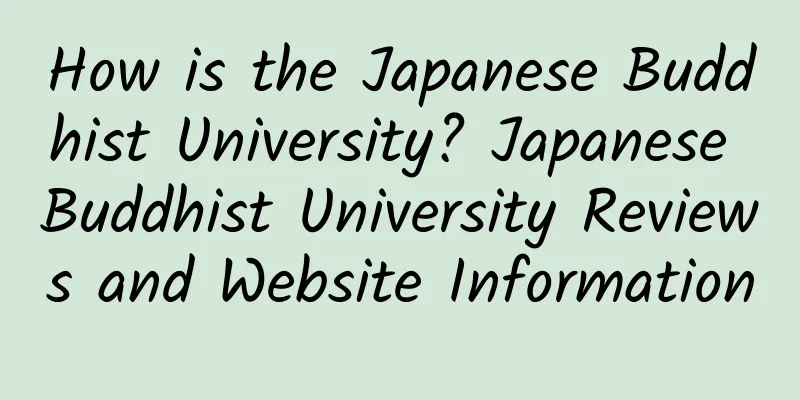How is the Japanese Buddhist University? Japanese Buddhist University Reviews and Website Information

|
What is the website of Japan Buddhist University? Bukkyo University is a private university in Japan, located in Kita-ku, Kyoto. It was founded in 1949 and has faculties of Buddhism, literature, history, and education. Website: www.bukkyo-u.ac.jp Japanese Buddhist University: A Place Where Academics and Faith MeetIn Japan, higher education institutions not only undertake the task of training professional talents, but also shoulder the important mission of inheriting culture and ideas. Among them, Bukkyo University, as a unique private university, is famous for its profound Buddhist background and diversified academic system. Founded in 1949, Bukkyo University is located in Kita-ku, Kyoto City. This geographical location gives it a strong historical and cultural atmosphere. As one of the core cities of traditional Japanese culture, Kyoto provides a unique environment for this university, enabling it to achieve outstanding achievements in academic research and religious education. The official website of the Buddhist University is www.bukkyo-u.ac.jp . Through this website, students, scholars and the public interested in Buddhist culture can gain a deeper understanding of the university's philosophy, curriculum, campus life and research results. The following will comprehensively analyze the uniqueness of the Japanese Buddhist University and its influence in the global academic community from multiple perspectives. Historical Origins and Founding BackgroundThe founding of Buddhist universities in Japan can be traced back to 1949 after World War II, a period when Japanese society was undergoing a critical period of profound change. After the war, with the implementation of the Constitution of Japan and the advancement of educational reforms, the field of higher education ushered in unprecedented development opportunities. Against this background, Buddhist universities came into being, aiming to promote the modernization of Buddhist thought through systematic academic research and educational practice, and integrate it into the needs of modern society. The birth of Buddhist University is inseparable from the support of the Jodo Shinshu Honganji sect. As one of the most influential Buddhist sects in Japan, Jodo Shinshu is known for its open and inclusive attitude and its philosophy of caring for the public. With the support of this sect, Buddhist University has been able to combine traditional Buddhist wisdom with modern academic methods and create a unique educational path. Its original intention was to cultivate talents with profound humanistic qualities and social responsibility through the power of education, so as to contribute to the realization of social harmony and human welfare. Since its establishment, Buddhist University has always adhered to the school philosophy of "pursuing truth and peace based on the Buddhist spirit". This philosophy is not only reflected in the school's curriculum, but also runs through all aspects of campus life. For example, the school regularly holds lectures, seminars and cultural exchange activities to encourage students to explore the application value of Buddhist thought in contemporary society. At the same time, Buddhist University also actively cooperates with universities in other countries and regions to promote international academic exchanges and dialogues, further expanding its global vision. Core departments and discipline characteristicsJapanese Buddhist University is famous for its rich academic departments and unique academic characteristics, covering a variety of fields such as the Department of Buddhism, the Department of Literature, the Department of History, and the Department of Education. These departments not only provide students with a variety of academic choices, but also reflect the balance and innovation between traditional Buddhist culture and modern academic research. First of all, as one of the core pillars of Buddhist universities, the Faculty of Buddhism is committed to in-depth research on Buddhist scriptures, teachings, and their practical applications in modern society. The courses offered by the faculty include Buddhist philosophy, scripture interpretation, meditation practice, etc., focusing on cultivating students' comprehensive understanding of Buddhist thought and critical thinking ability. In addition, the Faculty of Buddhism also places special emphasis on cross-cultural perspectives, encouraging students to compare the ethics and values of different religious systems, thereby broadening their academic horizons. Secondly, the Faculty of Literature focuses on linguistics, literary theory, and cultural studies, providing students with a platform to explore human thought and emotional expression. Here, students can not only learn the essence of Japanese classical literature, but also be exposed to literary works from around the world, and improve their literary literacy through multi-dimensional text analysis. It is worth mentioning that the Faculty of Literature also has a special Buddhist literature course that explores how Buddhist thought influences literary creation in East Asia, providing students with a unique research entry point. The Faculty of History is another important academic department of the Buddhist University, focusing on the study of Japanese history, Asian history, and global history. Through the careful analysis of historical events, students can better understand the laws of social change and the cultural motivations behind them. In particular, the historical research on the spread and development of Buddhism has become a highlight of the department. Students can gain an in-depth understanding of the social role of Buddhism in different periods and its evolution through field visits and literature research. Finally, the Faculty of Education is committed to training future educators, especially professionals in the fields of religious education and moral education. The faculty emphasizes a teaching model that combines theory with practice, and helps students master advanced educational concepts and teaching skills through internships, seminars, etc. In addition, the Faculty of Education also pays special attention to areas such as special education and mental health counseling, striving to provide more diversified educational support to society. In general, the various departments of Buddhist University not only demonstrate its profound academic background, but also reflect the school's comprehensive consideration of talent training. Through these diverse and in-depth course settings, Buddhist University has successfully combined traditional Buddhist culture with modern academic research, providing students with a learning environment full of challenges and opportunities. International Vision and International Exchange ProgramsJapan Buddhist University has demonstrated strong initiative and far-reaching strategic vision in the process of internationalization. As an institution of higher learning with a profound Buddhist cultural heritage, the university not only attaches importance to the inheritance of local culture, but also actively expands the international exchange network and promotes academic dialogue and cooperation in the context of globalization. At present, the Buddhist University has established cooperative relations with universities in more than 30 countries and regions, covering North America, Europe, Asia and Oceania. This extensive international cooperation network provides teachers and students with rich learning and research opportunities, enabling them to deepen their understanding of Buddhist thought in the context of globalization. In terms of specific forms of cooperation, Buddhist University has launched a number of international exchange programs, including short-term exchange programs, joint degree programs, and transnational research cooperation. For example, the school selects outstanding students every year to go to overseas partner institutions for a study abroad experience of six months to one year, allowing them to experience the academic atmosphere under different cultural backgrounds. At the same time, Buddhist University also accepts international students from all over the world, providing them with comprehensive language training and academic guidance to ensure that they can successfully complete their studies in a foreign country. In addition, the Buddhist University has also set up the "International Buddhist Research Center" to promote Buddhist studies from a cross-cultural perspective. The center regularly holds international academic conferences, workshops and special lectures, inviting top scholars from around the world to discuss the application value of Buddhist thought in contemporary society. Through these activities, the Buddhist University has successfully built an open and shared academic platform to promote understanding and respect between different cultures. It is worth noting that Buddhist universities always adhere to the principle of two-way interaction in international exchanges. On the one hand, the school strives to show the charm of traditional Japanese culture to the outside world; on the other hand, it also actively absorbs the essence of ideas from other countries and regions to enrich its own academic content. For example, in recent years, the school has strengthened cooperation with East Asian countries such as China and South Korea to jointly carry out research projects on the dissemination of Buddhist culture. This cooperation model based on regional cultural commonalities not only deepens mutual understanding, but also provides new ideas for solving regional problems. In short, Japan Buddhist University has established a good reputation in the global academic community by continuously deepening its internationalization process. The diversity and effectiveness of its international exchange programs not only enhance the school's international influence, but also create valuable global vision and cross-cultural experience for students, making them more competitive in their future careers. Campus life and cultural activitiesThe campus life of Japan Buddhist University is full of vitality and diversity, providing students with a rigorous and fun growth environment. The school attaches great importance to the all-round development of students, so in addition to academic courses, it also organizes a variety of cultural activities and community life, so that students can find their own interests in addition to intense study. First of all, Buddhist universities have many active student clubs, covering many fields such as art, sports, and academic research. For example, the "Zen Meditation Club" is a popular club among students. Members explore the essence of Buddhist practice through regular meditation exercises and discussions. In addition, there are traditional culture-related clubs such as the "Tea Ceremony Club" and the "Calligraphy Club". These activities not only help students gain a deeper understanding of Japanese traditional culture, but also become an effective way for them to relax and cultivate their sentiments. Secondly, the school holds a large cultural festival every year - the "Buddhist University Festival". This event attracts many audiences from both inside and outside the school, and showcases the talents and creativity of students. During the cultural festival, students will plan various performances, exhibitions and food stalls, including artistic creations with Buddhist themes, such as Buddhist music performances and Buddhist painting exhibitions. These activities not only enhance students' organizational skills and teamwork spirit, but also provide them with a stage to show their own style. In addition, Buddhist University also pays great attention to creating an inclusive and harmonious campus atmosphere. The school regularly holds cross-cultural theme activities, inviting international students to share their cultural customs and promote communication and understanding between students from different backgrounds. For example, "World Night" is a popular event where participants can experience the charm of multiculturalism by tasting food from various countries and appreciating folk dances. It is worth mentioning that the library resources of the Buddhist University are also very rich, providing strong support for students' extracurricular learning. The library has a large collection of precious documents on Buddhist classics, and is also equipped with modern digital reading equipment to meet the learning needs of different levels. In addition, the library also regularly holds reading clubs and special lectures to stimulate students' thirst for knowledge. In summary, campus life at Japan Buddhist University is not only a fertile ground for academic growth, but also a broad space for the development of personal interests. Through rich and colorful cultural activities and club life, the school creates an ideal environment for every student to pursue knowledge and enjoy life. Graduate employment and development prospectsGraduates of Japan Buddhist University have shown strong competitiveness in the job market with their solid professional knowledge, profound cultural heritage and excellent comprehensive qualities. The school has long focused on cultivating students' practical ability and sense of social responsibility, so that graduates have performed well both in academic research and in workplace practice. According to the latest statistics, the employment rate of Buddhist University graduates has always remained at a high level, especially in the fields of education, culture, religion and social services, occupying an important position. First, in the education industry, Buddhist university graduates are highly favored for their excellent teaching ability and profound philosophical thinking. Many graduates choose to enter primary and secondary schools or higher education institutions to engage in teaching, especially in the fields of religious education and moral education. In addition, some graduates also actively participate in textbook compilation, curriculum design and other work, making important contributions to promoting the development of education. Secondly, in the field of culture and art, graduates of Buddhist universities have also demonstrated extraordinary talents. Whether they are museum curators, art critics or cultural heritage protection experts, they have won wide recognition for their deep understanding of traditional culture and innovative ability. In particular, graduates who specialize in Buddhist art and history often play a key role in international cultural exchange projects. Graduates of Buddhist universities play an indispensable role in religious affairs. Many choose to return to temples to serve as monks or managers, committed to promoting the Buddhist spirit and serving the community. At the same time, many graduates also devote themselves to non-governmental organizations (NGOs), focusing on public welfare, environmental protection and other public welfare undertakings, and practicing the Buddhist concept of compassion and saving the world with practical actions. It is worth noting that as the process of globalization accelerates, graduates of Buddhist universities are gradually involved in multinational corporations, international trade, and international relations. They use their cross-cultural vision and communication skills to stand out in these highly competitive industries. For example, some graduates who are proficient in Buddhist philosophy are hired as corporate consultants to help companies develop ethical corporate strategies; others are active in international organizations, contributing to promoting global peace and development. In addition, Buddhist University also attaches great importance to the construction of alumni networks, and provides continuous support and help to graduates by regularly holding career development forums, entrepreneurship guidance and other activities. This concept of lifelong learning not only enhances the adaptability of graduates, but also opens up a broader space for their development. In short, graduates of Japan Buddhist University have achieved remarkable success in all walks of life with their unique educational background and comprehensive abilities. Whether they continue their studies or find employment directly, they can confidently meet future challenges and inject continuous impetus into the progress of society. Summary and OutlookAs an institution of higher learning with profound historical and cultural heritage and modern academic innovation, Japan Buddhist University not only enjoys a high reputation in Japan, but also occupies a place in the international academic community. From its unique educational philosophy to diversified student life and broad employment prospects, the success story of Buddhist University fully demonstrates the importance of combining traditional wisdom with modern education. Looking back at the development history of Buddhist University, we can see that it has always adhered to the Buddhist spirit as the core, while constantly adapting to the changes of the times and actively exploring new educational models and research directions. This attitude of coexistence of perseverance and innovation enables the school to maintain vitality and competitiveness in a rapidly changing social environment. Whether it is broadening students' global vision through international exchange programs or promoting students' all-round development through colorful campus activities, Buddhist University is working hard to practice the "people-oriented" education philosophy. Looking to the future, with the deepening of globalization and the rapid development of science and technology, Buddhist universities are facing new opportunities and challenges. On the one hand, the university needs to further strengthen cooperation with universities in other countries and regions to attract more international students and scholars to join this big family; on the other hand, it also needs to increase investment in emerging disciplines, such as artificial intelligence and Buddhist ethics, sustainable development and religious responsibility, and other interdisciplinary research, in order to cope with the increasingly complex problems of modern society. In addition, the Buddhist University can further utilize its official website platform ( www.bukkyo-u.ac.jp ) not only as a window for information release, but also as a bridge connecting Buddhist researchers and enthusiasts around the world. Through online courses, virtual seminars, etc., more people will have the opportunity to get in touch with and gain a deeper understanding of the essence of Buddhist culture. In short, Japan Buddhist University will continue to uphold its fine traditions in the future, while bravely exploring unknown areas and making unremitting efforts to cultivate more outstanding talents with international vision and social responsibility. I believe that with the joint efforts of all teachers and students, this historic and vibrant university will surely write a more glorious chapter in the new era. |
<<: How is Edenred? Edenred reviews and website information
Recommend
The efficacy and function of vermicelli
Vermicelli is also called lung grass or small lun...
What is the Portuguese Ministry of Education like? Portuguese Ministry of Education reviews and website information
What is the website of the Portuguese Ministry of ...
The efficacy and function of Chinese toon
Toona sinensis is a very good vegetable. In addit...
Nutritional value and efficacy of Yangxincai
Many people have heard of Yangxincai, but don’t k...
Can pregnant women eat oranges?
Can pregnant women eat tangerines? I believe many...
The advantages and disadvantages of drinking milk powder
Milk powder is a common dairy product. It is rich...
Benefits of carrot and corn juice
Carrot and corn juice is a drink made from carrot...
How is the University of Parma? University of Parma reviews and website information
What is the website of the University of Parma? Fo...
Red Grape
Introduction Red Grape, also known as Late Red, R...
Cultivation method of purple flowered Oxalis
Purple Oxalis is a perennial herb. When it grows ...
What foods can make your hair grow faster?
Hair is a symbol of beauty and health. No matter ...
The efficacy, effects and contraindications of kiwifruit soaked in vinegar
Have you ever tried kiwifruit vinegar? The kiwifr...
Tomato Soy Milk Weight Loss Method
Winter is the season for weight gain, so how can ...
The efficacy and function of the colorful cloud ball
The colorful cloud ball is also called colorful c...
The benefits of drinking red bean soup for beauty and the taboos of eating red bean soup
Red bean soup is a delicious food. The benefits o...









